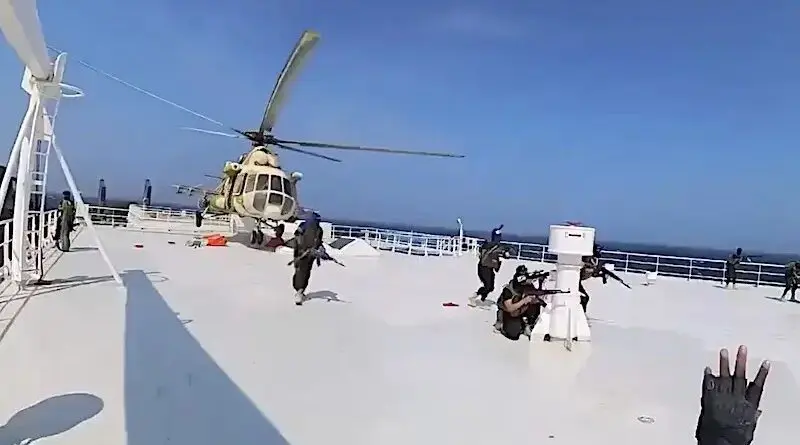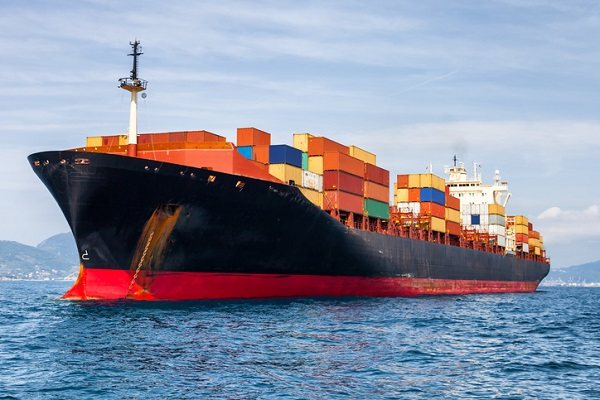
‘Explosions’ Alert After Houthi Drones, Missiles Hit Red Sea Ships
By Arab News
By Saeed Al-Batati
At least two commercial ships are believed to have been hit by drones and missiles launched by the Iran-backed Houthis in Yemen on Tuesday as the militia’s leaders pledged to confront a US-led international naval task force in the Red Sea.
The UK’s Maritime Trade Operations authority received information from a ship on Tuesday afternoon saying an explosion had been heard and missiles spotted 60 nautical miles from Yemen’s Red Sea port of Hodeida.
An alert was also issued three hours earlier by UKMTO saying that a vessel had reported two explosions 15 minutes after seeing drones roughly 50 nautical miles west of Hodeidah.
The Houthis have not yet claimed responsibility for the attacks as of late Tuesday.
The Yemen militia has launched ballistic missiles and drones against commercial and naval ships in the Red Sea in a bid to force Israel to end its assault on Gaza.
Houthi threats to hit Israeli-linked vessels have forced some major shipping firms, including Maersk and MSC, to reroute ships away from the key trade route.
The US is leading a global task force coalition to protect the crucial maritime link from Houthi strikes.
At the same time, the Houthis have repeated their threat to strike US-led forces or any other group if Yemen is attacked or if action is taken to stop the militia targeting ships bound for Israel.
Mohammed Al-Ateifi, Houthi defense minister, claimed his fighters are in “full combat readiness” to deal with any military response from the US or other countries, and vowed to continue missile and drone attacks in the Red Sea in solidarity with the people of Gaza.
“The ranges of our strategic deterrent weapons exceed what the enemies expect, and there are no red lines in front of us. All options are available,” the Houthi military leader told a meeting of commanders in Sanaa on Monday.
Meanwhile, Somali pirates captured a vessel carrying 43 Yemeni fishermen 30 miles off the Somali coastline area of Hafun on Sunday, according to Yemeni fishermen in the Red Sea Khokha region in Yemen.
Pirates sailed the seized boat to Somalia, where they freed 34 of the captives and sailed away with the remaining nine, heading to international waters.
“Those fishermen have a license from the Somali authorities to fish in Somali water,” said a relative of one of the abducted fishermen, who asked to remain anonymous.
Houthi forces hijack cargo ship in the Red Sea. Photo Credit: Houthi Media Center video screenshot
Iran-backed Houthis claim responsibility for attack on Red Sea container ship
Houthi military spokesman Yahya Sarea said the group had targeted the vessel MSC United, after the crew failed to respond to warnings

This may affect steel supplies to the Middle East region and shake prices for these products
Цей матеріал також доступний українською
26 DECEMBER 2023

In the Red Sea region off the coast of Somalia, a ship carrying steel coils from Korean steelmaker Posco (the company does business through Samsung) was hijacked by pirates.
Source. This was reported by CTS with reference to MMC Center.
The products on board the Maltese-flagged Ruen vessel were intended for Turkish buyers.
According to market sources, the vessel is carrying about 40 thousand tons of steel coils.
The company is negotiating with the pirates to free the bulk carrier.
As of December 13, the Ruen was on its way to the port of Gömlik in Turkey. It entered the risk zone in the Gulf of Aden in the southern Red Sea on December 15. According to ship tracking programs, the bulk carrier has been off the central coast of Somalia since December 18.
A representative of West of England Insurance Services said that they were cooperating with the relevant authorities and could not comment at this time.
Sources at Turkish steelmakers believe that the incident could disrupt supplies from Asia to the region, which would push up prices for coiled steel.
Traders and Turkish buyers speculate that shipowners and charterers may try to avoid the Red Sea and Suez Canal route by choosing a longer and more expensive route around the Cape of Good Hope and along the east coast of Africa. This will also affect the cost of sailing in the Mediterranean region.
As reported, transportation companies have begun to redirect ships from the Middle East region amid more frequent attacks in the Red Sea and Gulf of Aden. Some companies are trying not to send ships to the region at all, instead choosing a route around Africa, which increases the travel time by two weeks.
Risks to shipping in the Red Sea and the Bab el-Mandeb Strait, through which about 10% of the world's maritime oil supplies pass, have increased amid Israel's war with Hamas. The Yemeni Houthis have expressed their support for the Palestinians and have been attacking ships in the strait.
Текст: Nadiya Palyvoda, international news editor
Nicholas Jacobino and Josh Lipton
Tue, December 26, 2023
Conflicts in the Red Sea are ongoing, causing major grief for shipments through an area of the world that is responsible for 10% of global trade. Maersk (MAERSK-A.CO, MAERSK-B.CO) is geared up to resume transit through the area, in conjunction with US led multinational Naval operations. Salvatore Mercogliano, Campbell University Department of History Chair, joins Yahoo Finance to give insight into the efforts and costs associated with resuming trade through that area.
Mercogliano explains one of the costs Maersk has to deal with is with war risk insurance: "The war risk insurance had climbed dramatically, it went from 0.02% of the entire value of the cargo of the ship to 0.7% and we are talking about ships that are loaded with billions of dollars, it's one of the reasons why container ships did the diversion because their cargoes are some much more valuable than what you get in a traditional tanker."
For more expert insight and the latest market action, click here to watch this full episode of Yahoo Finance Live.
Video Transcript
[AUDIO LOGO]
JOSH LIPTON: Mediterranean shipping company suffering an attack on one of its container ships while transiting the Red Sea. Meanwhile, logistics company, Maersk, gears up to resume transit through the Red Sea with the aid of a US-led multinational naval operation to protect shipments. This comes as the flow of global trade finds itself already under pressure from a severe drought, constraining voyages through the Panama Canal to the World Trade Organization forecasting a hit to global trade growth this year as rising rates dent consumer spending.
Joining us now is Sal Mercogliano, a Campbell University Department of History criminal justice and political science chair. Sal, it's good to see you. I actually want to begin with this headline, Sal, on Maersk, shipping giant, intending to gradually resume service through the Red Sea. I was wondering, Sal, if you saw that, you saw that headline, you saw those reports. Did you see that, Sal, as perhaps a sign of possible normalization and stabilization here?
SALVATORE MERCOGLIANO: I think Maersk is the one who first kicked this whole off. I mean, they were the ones who announced their initial withdrawal from going through the Red Sea. I think Maersk is trying to get back to normal service, but they're also hedging their bets. If you look at the ships that are going to be heading for the Suez right now, it's about a dozen ships out of the Mediterranean in Europe. This is part of their effort to replace and reposition empty containers.
Because of the longer voyage associated with going around Africa, they were going to wind up in a position where they didn't have enough empty boxes to reload back in Asia. So they're trying to get their vessels. And since the US Navy just did a successful series of convoy operations, including three Maersk line ships that are US-flagged, I think Maersk is willing to go ahead and take it. Obviously, what they want to do is get their ships through but because of the high value of the cargo on container ships, the war risk insurance that added little extra insurance that they need is a really high premium for them to pay.
JULIE HYMAN: And so, Sal, what do the economics of all of this look like right now? I mean, basically, will this protection that they are getting make it economically viable again to sail through? Or are they going to have to rethink the model? Is it going to be successful?
SALVATORE MERCOGLIANO: It's really depending-- I got to imagine right now Maersk is going to their insurancers and trying to find out what kind of war risks they can get. The war risk insurance had climbed dramatically. It went from 0.02% of the entire value of the cargo of the ship to 0.7%. And we're talking-- when you're talking about ships that are loaded with billions of dollars, it's one of the reasons why container ships did the diversion because their cargoes are so much more valuable than what you get in a traditional tanker.
Also, at the same exact time, remember, the container liners were going into 2024 in a pretty bad position. They had overcapacity of ships. They had lagging freight rates. And one of the things that this diversion has done is put more ships out in the water carrying cargo. And it's also artificially inflated the freight rates, particularly those between Europe and Asia, because that freight rate is being renegotiated as of January 1st.
No comments:
Post a Comment